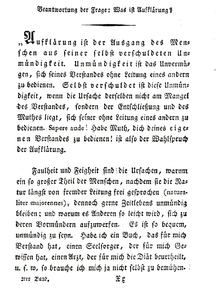Sapere aude
Sapere aude is a Latin proverb and means dare to be wise! It is mostlyquotedin the interpretation of Immanuel Kant , who declared it to be the motto of the Enlightenment in 1784: "Have the courageto useyour own understanding !"
origin
The quote comes from the first book of the epistles (letters) written by the Roman poet Horace in 20 BC. Published (Epist. I, 2.40 f.). The complete hexameter reads: Dimidium facti, qui coepit, habet: sapere aude, / incipe . Rudolf Helm translates: “Once started is half done. Make up your mind to see ! Just start! "
The first part of the quote has itself acquired a proverb character: “Freshly dared is half done!”. In the translation, which is closer to the Latin form, it says: "Who (first) started, has already acted halfway!"
The second part of the quote says literally “Dare to be wise!”, Whereby aude is the imperative singular of audere (Latin: “dare”, “want”, “be eager”) and sapere (Latin: actually: “ taste ”; root: sap- =“ taste ”,“ smell ”,“ notice ”; ahd. int-sebjan ,“ notice ”; in the figurative sense:“ gain wisdom ”,“ understand ”) is the infinitive in this construction.
The third part: incipe is also an imperative singular and means: "[...] begin!" (From incipere )
The epistle from which the verse is taken deals with the moral lessons that can be drawn from Homer's poetry. Specifically, verses 27–43 deal with the copy of Antinous and the other suitors of Penelope , who lived into the day with partying and idleness in Odysseus ' palace until he came home and killed them all.
Motto of the Enlightenment

The Society of Truth- Lovers (Alethophiles) and Johann Christoph Gottsched used this motto as early as 1740 .
This quote became famous with the above translation by Immanuel Kant in his essay answering the question: What is the Enlightenment of 1784 as the main idea of the Enlightenment . This paraphrase of the exclamation sapere aude has not established itself as the standard translation.
Friedrich Schiller cited the quote as a "highly significant expression" of an "old wise man" in the 8th letter of his treatise On the Aesthetic Education of Man of 1795 and translated it as "Dare to be wise."
literature
- Georg Büchmann (founder): Winged words. The classic treasure trove of quotes . 43rd edition, revised by Winfried Hofmann , Walter Robert-Tornow [and 6 others]. Ullstein Taschenbuch 36953, Frankfurt am Main / Berlin 2015 (first edition 1864), ISBN 978-3-548-36953-2 .
- Quintus Horatius Flaccus : Sermones et epistulas = satires and letters (= The Library of the Old World. Roman Series ), translated and introduced by Rudolf Helm , Artemis, Zurich / Stuttgart 1962, DNB 452102111 , OCLC 882932901 (bilingual edition, Latin and German) .
Web links
- 1784: Answer to the question: What is Enlightenment - freely accessible at DigBib.Org , Wikisource , www.prometheusonline.de and at the German Text Archive
Individual evidence
- ↑ Georg Büchmann : Winged words. The classic treasure trove of quotes . 39th edition, revised by Winfried Hofmann. Ullstein, Frankfurt am Main / Berlin 1993, p. 330.
- ↑ Horace: Satires and Epistles , translated by Rudolf Helm. Artemis, Zurich / Stuttgart 1962, p. 220 f.
- ↑ Johannes Bronisch : The patron of the Enlightenment. Ernst Christoph von Manteuffel and the Network of Wolffianism (Early Modern Age 147), Berlin / New York 2010, p. 161 ff .; Eric Achermann (Ed.): Johann Christoph Gottsched (1700-1766): Philosophy, Poetics and Science. 2014, p. 36 f.
- ↑ Full text on Archive.org (p. 169. 8th letter = pp. 166–172).
